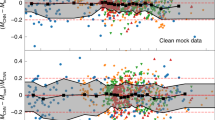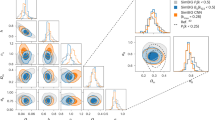Abstract
Cosmic shear estimation is an essential scientific goal for large galaxy surveys. It refers to the coherent distortion of distant galaxy images due to weak gravitational lensing along the line of sight. It can be used as a tracer of the matter distribution in the Universe. The unbiased estimation of the local value of the cosmic shear can be obtained via Bayesian analysis which relies on robust estimation of the galaxies ellipticity (shape) posterior distribution. This is not a simple problem as, among other things, the images may be corrupted with strong background noise. For current and coming surveys, another central issue in galaxy shape determination is the treatment of statistically dominant overlapping (blended) objects. We propose a Bayesian Convolutional Neural Network based on Monte-Carlo Dropout to reliably estimate the ellipticity of galaxies and the corresponding measurement uncertainties. We show that while a convolutional network can be trained to correctly estimate well calibrated aleatoric uncertainty, -the uncertainty due to the presence of noise in the images- it is unable to generate a trustworthy ellipticity distribution when exposed to previously unseen data (i.e. here, blended scenes). By introducing a Bayesian Neural Network, we show how to reliably estimate the posterior predictive distribution of ellipticities along with robust estimation of epistemic uncertainties. Experiments also show that epistemic uncertainty can detect inconsistent predictions due to unknown blended scenes.
The first author is preparing a PhD thesis at the LORIA Lab in the context of the AstroDeep Research Project (https://astrodeep.pages.in2p3.fr/website/projects/) funded by ANR under the grant ANR-19-CE23-0024.
Access this chapter
Tax calculation will be finalised at checkout
Purchases are for personal use only
Similar content being viewed by others
References
Gal, Y., Ghahramani, Z.: Dropout as a Bayesian approximation: representing model uncertainty in deep learning. In: ICML Proceedings 2016, JMLR Workshop and Conference Proceedings, vol. 48, pp. 1050–1059 (2016)
LeCun, Y., Bengio, Y., Hinton, G.: Deep learning. Nature 521(7553), 436–444 (2015)
Gal, Y.: Uncertainty in deep learning, PhD thesis, University of Cambridge (2016)
Gal, Y., Hron, J., Kendall, A.: Concrete dropout. In: NIPS Proceedings 2017, pp. 3581–3590 (2017)
Lakshminarayanan, B., Pritzel, A., Blundell, A.: Simple and scalable predictive uncertainty estimation using deep ensembles. In: NIPS Proceedings 2017, pp. 6402–6413 (2017)
Kendall, A., Gal, Y.: What uncertainties do we need in Bayesian deep learning for computer vision? In: NIPS Proceedings 2017, pp. 5574–5584 (2017)
Srivastava, N., et al.: Dropout: a simple way to prevent neural networks from overfitting. J. Mach. Learn. Res. 15, 1929–1958 (2014)
Le, V.Q., Smola, J.A., Canu, S.: Heteroscedastic Gaussian process regression. In: ICML Proceedings 2005, vol. 119, pp. 489–496 (2005)
Hüllermeier, E., Waegeman, W.: Aleatoric and epistemic uncertainty in machine learning: a tutorial introduction. CoRR. http://arxiv.org/abs/1910.09457 (2019)
Depeweg, S., et al.: Decomposition of uncertainty in Bayesian deep learning for efficient and risk-sensitive learning. In: ICML Proceedings 2018, vol. 80, pp. 1192–1201 (2018)
Hinton, G.E., van Camp, D.: Keeping the neural networks simple by minimizing the description length of the weights. In: Proceedings of the Sixth Annual ACM Conference on Computational Learning Theory, COLT 1993, pp. 5–13 (1993)
Dieleman, S., Willett, W.K., Dambre, J.: Rotation-invariant convolutional neural networks for galaxy morphology prediction. Mon. Not. R. Astron. Soc. 450(2), 1441–1459 (2015)
Kaiser, N., Squires, G., Broadhurst, T.: A method for weak lensing observations. Astrophys. J. 449, 460–475 (1995)
Rowe B., et al.: GalSim: the modular galaxy image simulation toolkit. https://github.com/GalSim-developers/GalSim (2015)
Goodfellow, I.J., et al.: Maxout networks. In: Proceedings of the 30th International Conference on Machine Learning, vol. 28, pp. 1319–1327 (2013)
Abell, P.A., et al.: LSST science collaboration. LSST science book. arXiv, arXiv:0912.0201 (2009)
Kilbinger, M.: Cosmology with cosmic shear observations: a review. Rep. Prog. Phys. 78, 086901 (2015)
Bosch, J., et al.: The hyper suprime-cam software pipeline. Publications of the Astronomical Society of Japan 70, S5 (2018)
Sanchez, J., Mendoza, I., Kirkby, D.P., Burchat, P.R.: Effects of overlapping sources on cosmic shear estimation: statistical sensitivity and pixel-noise bias. arXiv e-prints. arXiv:2103.02078 (2021)
Mandelbaum, R., et al.: The third gravitational lensing accuracy testing (GREAT3) challenge handbook. Astrophys. J. Suppl. Ser. 212, 5 (2014)
Mandelbaum, R.: Weak lensing for precision cosmology. Annu. Rev. Astron. Astrophys. 56, 393 (2018)
Bertin, E., Arnouts, S.: SExtractor: software for source extraction. Astron. Astrophys. Suppl. Ser. 117, 393 (1996)
Melchior, P., et al.: SCARLET: source separation in multi-band images by constrained matrix factorization. Astron. Comput. 24, 129 (2018)
Arcelin, B., Doux, C., Aubourg, E., Roucelle, C.: LSST dark energy science collaboration: deblending galaxies with variational autoencoders: a joint multi-band, multi-instrument approach. Mon. Not. R. Astron. Soc. 500, 531 (2021)
Author information
Authors and Affiliations
Corresponding author
Editor information
Editors and Affiliations
Rights and permissions
Copyright information
© 2021 Springer Nature Switzerland AG
About this paper
Cite this paper
Theobald, C., Arcelin, B., Pennerath, F., Conan-Guez, B., Couceiro, M., Napoli, A. (2021). A Bayesian Convolutional Neural Network for Robust Galaxy Ellipticity Regression. In: Dong, Y., Kourtellis, N., Hammer, B., Lozano, J.A. (eds) Machine Learning and Knowledge Discovery in Databases. Applied Data Science Track. ECML PKDD 2021. Lecture Notes in Computer Science(), vol 12979. Springer, Cham. https://doi.org/10.1007/978-3-030-86517-7_9
Download citation
DOI: https://doi.org/10.1007/978-3-030-86517-7_9
Published:
Publisher Name: Springer, Cham
Print ISBN: 978-3-030-86516-0
Online ISBN: 978-3-030-86517-7
eBook Packages: Computer ScienceComputer Science (R0)





